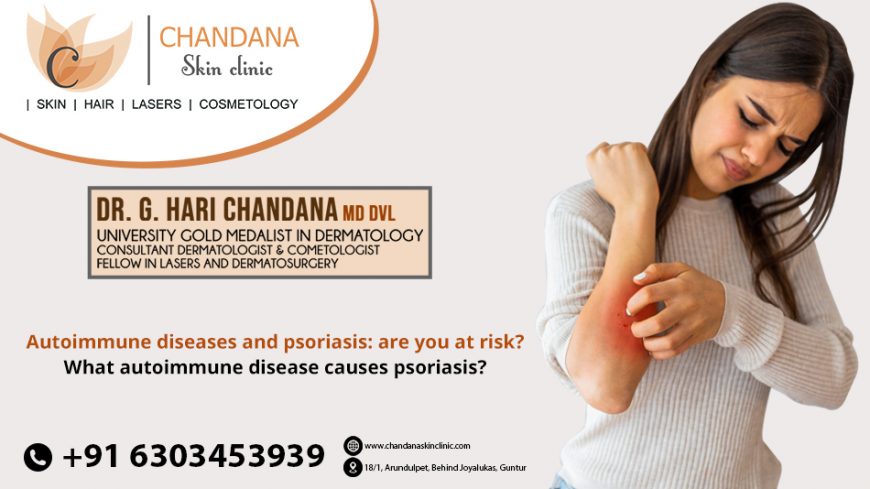What autoimmune disease causes psoriasis?
Having psoriasis increases your chances of having certain other diseases. Read about them Here.
Is Psoriasis linked to autoimmune diseases? & What type of autoimmune disease is Psoriasis
Of the 21 examined autoimmune diseases, 17 were found to be associated with psoriasis, including alopecia areata, celiac disease, scleroderma, lupus, and the syndrome among Sjogren. Psoriasis-related autoimmune disease was rheumatoid arthritis (RA).
Psoriasis is actually an autoimmune condition, not just a skin despair, given its very noticeable presence on your body. These characteristics are expressed by autoimmune diseases. The internal protection system of your body misfires with all autoimmune diseases and your body eventually starts attacking itself.
If your question was “Is Guttate Psoriasis an autoimmune disease ?
Guttate psoriasis is also a form of psoriasis that makes it an autoimmune condition too. It occurs as red, scaly, tiny, teardrop-shaped spots on your body. It usually doesn’t leave a scar. As a child or young adult, you usually get it. This type is present in less than a third of people with psoriasis. However, it is not as common as psoriasis of plaque.
Can Psoriasis lead to other autoimmune diseases?
If you have psoriasis, one or more other autoimmune diseases are more likely to develop. A study published in the Journal of the American Academy of Dermatology in November 2012 concluded that people with psoriasis are almost twice as likely to develop other autoimmune diseases than people without psoriasis.
If you were wondering, “What is the main cause of Psoriasis” Is ?
Doctors remain unsure about what causes psoriasis, but they have a general idea of two key factors thanks to decades of research, namely biological and the immunity system.
Immune system
Psoriasis is a form of autoimmune. The effect of the body fighting itself is autoimmune disorders. In the case of psoriasis, the skin cells are mistakenly damaged by white blood cells known as T cells.
White blood cells are used in a human body to attack and destroy infectious bacteria and battle infections. This mistaken assault contributes to overdrive of the skin cell production process. The increased growth of skin cells allows the development of new skin cells too quickly. These are moved to the surface of the skin, where these stacks up.
Genetics
Many people inherit genes that increase their chances of developing psoriasis. If you have an immediate skin-affected family member, the chance of psoriasis is higher. Nevertheless, there is a small percentage of people with psoriasis and genetic predisposition. According to the National Psoriasis Foundation (NPF), approximately 2 to 3 percent of people with the gene develop the disease.
Psoriasis usually is associated to other diseases also, if you asked
What diseases are associated with Psoriasis?
Eight conditions commonly associated with psoriasis are as follows:
- Psoriatic Arthritis. Many people with psoriasis develop psoriatic arthritis.
- Pregnancy Complications.
- Polycystic Ovarian Syndrome.
- Depression.
- Metabolic Syndrome.
- Heart Disease.
- Chronic Obstructive Pulmonary Disease.
- Cancer.
Individuals with psoriatic arthritis may have psoriasis and arthritis symptoms. The condition causes widespread inflammation from the immune system to the digestive system which affects multiple processes in the body.
Psoriasis or PsA is a form of arthritis that affects up to 30% of people with psoriasis in the skin condition.
And to the question of “what organs does Psoriasis affect?”
many effects of PsA on the body are under investigation, including the vision, digestion, breathing, and movement of a person. We also explore the condition’s treatment options.
Can diet help?
Psoriasis autoimmune diet
Work on diet and psoriasis has been limited to date. Nonetheless, some small studies have provided hints as to how food could affect the disease.
Researchers have been looking into a potential connection as far back as 1969. In the journal Archives of Dermatology, researchers published a study showing no correlation between a low-protein diet and flare-ups of psoriasis. Nonetheless, more recent studies have found different results.
Low-calorie diet
Recent research has shown that a low-fat, low-calorie diet could reduce psoriasis severity. Researchers offered participants a low-energy diet of 800 to 1,000 calories per day for eight weeks in a 2013 study published in JAMA Dermatology. We then increased it for another eight weeks to 1,200 calories per day.
Participants not only lost weight, but also witnessed an increase of decreased psoriasis severity. Studies have hypothesized that obesity increases body inflammation, exacerbating psoriasis. It may therefore be beneficial to have a diet that results in weight loss.
Gluten-free diet
What about a diet free of gluten? Could that help? It depends on the sensitivities of the individual, according to some studies. Those with celiac disease and allergies to wheat may be helped by gluten avoidance.
A 2000 study found that the symptoms of psoriasis improved in people with gluten sensitivity on gluten-free diets. The psoriasis intensified as they returned to their regular diet. Some people with psoriasis find an increased tolerance to gluten in a 2005 study Trusted Source.
Antioxidant-rich diet
Although fruits and vegetables are an important part of any healthy diet, psoriasis patients may find it particularly important. For example, a 1996 study found an inverse relationship between carrot, tomato intake, and fresh fruit and psoriasis intake. All these foods contain high levels of natural antioxidants.
Another study found lower blood glutathione levels in patients with psoriasis. Glutathione is a potent antioxidant that can be found in garlic, onions, broccoli, kale, collars, cabbage and cauliflower. Scientists have hypothesized that an antioxidant-rich diet can help.
Avoid alcohol
A research carried out in 1993 found that people who consumed alcohol had little to no benefit from psoriasis treatments. A 1990 Trusted Source report compared psoriasis men with non-illness men. Men who drank about 43 grams of alcohol a day were more likely to have psoriasis, compared to men who drank only 21 grams a day.
Though we need much research on alcohol consumption, cutting back may help to ease the psoriasis symptoms.
Finally, Healthy Diet, Healthy Weight
Dermatologists recommended a healthy diet for people with psoriasis for a long time. That means lots of vegetables and berries, whole grains, and lean proteins. However, maintaining a healthy weight can provide substantial relief.
As studies show a strong correlation between weight gain and psoriasis. The increased risk for the disease was also associated with having a lower waist circumference, hip circumference, and waist-hip ratio.
Therefore, eat clean and stay lean to avoid flare-ups of psoriasis.


